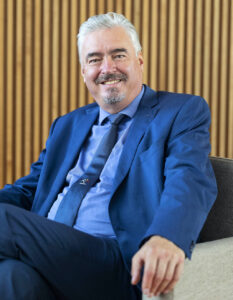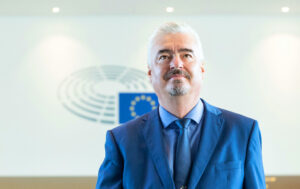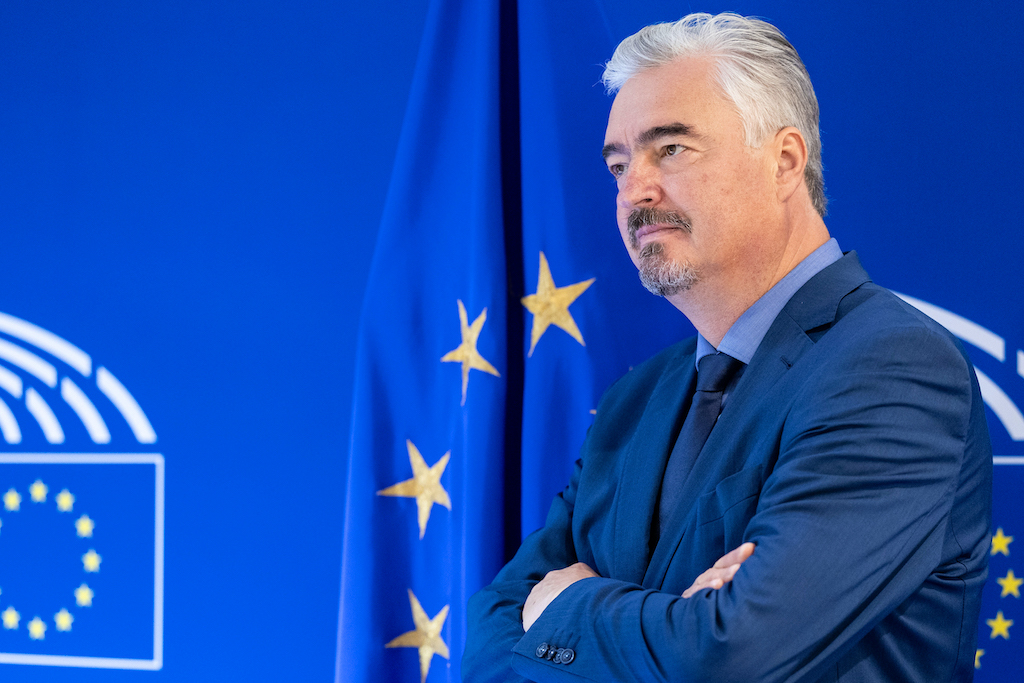With the MEP, political scientist and one of the most recognisable representatives of the Slovenian Democratic Party Dr Milan Zver, we talked about current events in both Brussels and Ljubljana. The main part of the conversation was dedicated to the European Union.
DEMOKRACIJA: Mr Zver, let us first touch on the report of the European Parliament’s Committee on Civil Liberties, Justice and Home Affairs (LIBE), which talks about Slovenia and was drafted under the leadership of Dutch Liberal MEP Sophie in ‘t Veld. Is it common for different European committees to scrutinise individual EU members?
With the latest resolution, Slovenia is also put on the pillory, as you have mentioned several times.
Zver: The European Parliament carries out various missions in the Member States and in third countries. This in itself is not unusual. But what matters is who controls the situation. The EPP (European People’s Party, fn.) is the strongest group, but it does not have real power in parliament to decide on the composition of missions and the content of reports, which later lead to parliamentary resolutions. The better organised left puts what it wants on the agenda. As a result, they confirm what they want. In our helplessness, in our group we too often succumb to the so-called mainstream politicians who are currently left.
This was also the case with this unfortunate story about the rule of law in Slovenia, which you mention. First, they formed a mission, then they had a controversial committee hearing and in their own way excommunicated the Prime Minister of the member of EU which is unique, then they visited Slovenia and wrote a report that is infected, as unauthorised individuals from Slovenian offices in the European Parliament took part in its creation. On this basis, the left has prepared a resolution on the rule of law in Slovenia, and as such it will unfortunately be voted on sooner or later. We prepared our own, but we did not manage to process it.
The resolution and the preliminary report are practically the result of Slovenian MPs Grošelj, Brglez, Fajon, Jovova with the strong support of Novak, who uncompromisingly attacked the Slovenian Prime Minister at a meeting of the EPP political group. These people will be personally responsible if a conditional mechanism for drawing European funds is ever used against Slovenia and if the basis for this is an incriminated resolution.
DEMOKRACIJA: Your colleague, MEP Romana Tomc, a member of the EP delegation who visited Slovenia, wrote on Twitter before the report was published that the report was not credible. “Opinions differed. The content of the report should be endorsed by all members of the mission. As a member I did not even see the DRFMG document, let alone confirm it,” she wrote. According to her, the report was being prepared behind closed doors, “apparently with the intention of discrediting the Slovenian government”. As she pointed out, the assistant to the MEP and SD president Tanja Fajon left his mark on this report or document… How do you comment on this?
Zver: It would have been better if they did not participate in this project at all.
DEMOKRACIJA: How do you comment on the content of the resolution, which expresses deep concern over the atmosphere of hostility, mistrust, and deep polarisation in Slovenia, which supposedly undermine trust in various public institutions and relations between them…
Zver: The content is not at the expected professional level. In the first versions, they attacked the Slovenian government in each paragraph, claiming that it was to blame for the poor state of the rule of law in Slovenia. When the government resolved the issues of delegated European prosecutors and the STA, the authors ran into trouble as they lost the main pillars on which they built the entire construct. In the latest version, the text is a bit milder, but the basic message remains. Therefore, it is by no means acceptable.

DEMOKRACIJA: How else do Slovenian domestic political stories resonate in Brussels? As I noticed, the leader of the European People’s Party in the European Parliament, Manfred Weber, said about the resolution on Slovenia that “this is an internal political story exported to the European floor”.
Zver: Yes, Weber, who is often in contact with Janez Janša, understands things. And some of our colleagues do not. I have a feeling that he himself does not control the parliamentary group enough, as the minority of the left-liberal Northerners has a disproportionate influence on group decision-making. I should also mention that it is unbelievable that a group of leftists has gathered on the LIBE committee, several of them Dutch from different parties. Now they are inveighing together on Slovenia, even earlier on Hungary and Poland, even though the Dutch have serious problems. Let’s just remember the killing of a journalist and the shooting of police officers at protesters.
DEMOKRACIJA: I would like to ask you how the fact that a new centre-left government led by Olaf Scholz, who was fascinated by Marxism in his youth, was confirmed in Germany a few days ago will affect its functioning.
Zver: It is not a problem that he was fascinated by Marxism in his youth. Many have. The problem is that a composition of left-wing parties has formed in Germany, probably also under the influence of neo-Marxism, at a time of very uncertain, vulnerable nature. The German government because of the economic policy that will be based on excessive greening, and consumer social services, can jeopardise the development of the country. The left-green paradigm is dominant in countries where the ELS/EPP does not find the right development answers. Some naively believe that inveighing on populism and souverainism and glorifying the digital and green perspective is in itself enough to win the election. Now that it is a little late, many are realising that with the German transformation we can expect a negative impact on the economic situation elsewhere, including Slovenia. For a start, energy prices will rise sharply where they have not yet. Then everything else, including food.
DEMOKRACIJA: In this regard, do you expect any EU geostrategic shifts towards other major global players, the US, Russia or, say, China?
Zver: Even before the German elections, geostrategic changes severely weakened the EU’s position. After nullifying free trade agreements with the EU, the United States have shifted to the Asia-Pacific region, which in this sense replaces the current Euro-Atlantic focus of the world, so to speak. The United Kingdom has chosen the “exit”, and Russia, since it is no longer our partner, is brutally destabilising our alliance. China is otherwise taking over the reins at the global level, including in some members of the Union. That is why we need to increase the Union’s resilience immediately and show strength.
DEMOKRACIJA: Mr. Zver, we live in an Advent time that is supposed to be marked by peace, compassion… But the “guidelines” prepared by European Commissioner Dalli resounded like a bomb in the European public. The matter is said to have gone so far as not to use the word Christmas, Christianity, etc. in public at all, as it would endanger others… Is it not scandalous that some in the European institutions are ashamed of their European roots, in fact the foundations on which European integration was built?
Zver: It is true, it is just awful where things are going. Years ago, the European Commission also issued a calendar in which Christmas was not mentioned at all. I remember asking for clarification at the time. I thought the story was sporadic. But now that it has recurred in an even more serious form, I find it to be a well-planned affair. Officially, these guidelines have not been published, but they have come to light. It is good that people can read what all the Eurocrats write. The message is clear, i.e., to eradicate religious and cultural diversity and to introduce a kind of cultural universalism or cultural globalism, or, as the authors themselves say, religious-cultural neutrality, given the indisputable fact that Islam is stronger in Europe year after year and Christianity weakens.
Interestingly, the infamous Sophie in ‘t Veld – by the way, recently a friend jokingly translated her name into Zofka from Polje (psychiatric clinic in Polje) – supported the Commissioner’s “neutrality” and emphasised that most Europeans are unfaithful, which is certainly untrue.

DEMOKRACIJA: Let’s go back to the previous topic. The Pope also reacted sharply to this new denial of Christmas.
Zver: Yes, he even compared this political position to dictatorship, starting with Napoleon, Nazism and Communism. At the request of our political group, we have a debate on this subject in Strasbourg.
DEMOKRACIJA: We can see that the EU is becoming more and more integrated and united in these difficult times!
Zver: Yes, you know this even better, because you are also dealing with this thesis in your doctoral dissertation. For the last decade, it has been fashionable in politics to say, ‘more Europe’, which has even been useful for some Member States for some time, as it has been about the urgent modernisation of post-communist societies in particular. At that time, Europe was the kind of light we wanted. But later, things fell apart in many places. Brussels was getting stronger; the members were losing their sovereignty. This has affected some of the more powerful countries, which have slowly begun to resist excessive regulation from Brussels.
DEMOKRACIJA: Is that why Poland and Hungary are being punished? Somehow, one cannot get rid of the feeling that if these were “old members” of the EU and if they had a left-wing, socialist government, this would not be happening to them…
Zver: I share this feeling with you. You can also join Slovenia to this group, which is treated with double standards. We will see what time will bring, but the fact is that this group will grow over time as Member States fight for more autonomy. Excessive unification gives birth to its opposite, both at the individual and social level. More and more people are looking for their roots, their private identity. Likewise, all nations that give something of themselves are constantly shaping their identity, their culture. And a key part of culture is also religion, which strongly directs our “Software of Mind,” our behaviour, our perception of things. Even if we are not religious, we behave in a religious context.
DEMOKRACIJA: So, is there no danger of losing Christmas so easily and Christianity in general if it is so deeply ingrained in our culture?
Zver: On the one hand, it is good that the values that are at the core of culture on a personal and collective level are a strong constant and do not change overnight. But we cannot say that they are not changing. They are not cemented. Such structures, operating from a position of power, authority, of course, have a strong influence on cultural change. Communism had it too, and it still has it. But not the dominant one. But if key cultural factors such as school, media, and government work together, many things can change. This could be called cultural engineering. Let me tell you what I experienced a few days ago in Brussels: on the way home from work, I read an advertising sign on the door to the EXKI food chain bar “Merry whatever and happy always”. Instead of Christmas, they wrote “anything”. Halloo? Do you not feel that this has offended our most central feelings and values, which have been associated with us since childhood as something best and wonderful? It is right that at least we are aware of these things if they are not aware of it in Brussels.
DEMOKRACIJA: Many feel that politics is moving too far to the left. Where will this take us?
Zver: True, we live in a time of domination of left-wing political paradigms. In the European Parliament, for example, the centre-right has formally ruled for more than two decades but has stagnated rapidly in recent years. In the EPP, we moved away from Martens’ spirit. Martens represented tolerance, breadth, and depth. Today, the initiative in our group was taken by the left-wing, which consists mainly of Scandinavians, who enjoy almost no support at home. Unfortunately, they are loud and heard here.
DEMOKRACIJA: We often say that Northerners or Westerners do not understand us.
Zver: Yeah, but it is not just about that. The West and the North have their problems. If a politician represents traditional values, he is threatened. That is why the right is disappearing there and that is why they are gradually losing their identity in the West. Today, Western Europe is only becoming a community without its own identity, which has been built over the centuries. Tell me what marks or makes Dutch people still Dutch, typical Danes still Danes or typical French still French. However, the answer is very easy if you ask the same question about Estonians, Poles, Hungarians, Croats, and some others who have preserved their cultural specialties and are proud of them.
DEMOKRACIJA: How else do you assess Slovenia’s presidency of the Council of the European Union, which expires at the end of December? We know that the Slovenian dominant media are trying to report on this only in a negative way. However, if there is an achievement of the Slovenian presidency, they prefer to keep it a secret…
Zver: Slovenia has fulfilled almost everything it set out to do at the beginning of its presidency. And there was a lot of that. Although we had about three times fewer employees to chair than e.g., Germany, we are taking this story well. I am most pleased that we have prevented the new illegal waves of migrants that unscrupulous smugglers intended to launch from destabilised Afghanistan.

DEMOKRACIJA: Well, despite the Slovenian presidency of the Council of the EU, the Slovenian government led by Janez Janša has been a constant target of attacks for months, in fact since taking oath. How do you assess its work in these times of crisis, epidemics? And the destructiveness of the opposition?
Zver: We have never had such a violent left, ready for anything, in Slovenia, except perhaps during the revolution; there are quite a few of these parallels. That is why the government is being attacked so harshly because it works very well, because it is effective. It is also responding very well to a pandemic while making the economy vital. These two are difficult to achieve at the same time, but the Janša government has proven that it works. This is one of the reasons why it enjoys a reputation in Europe.
DEMOKRACIJA: At the end of April next year, there will be regular parliamentary elections. How do you view the current redistribution of political space, the emergence of new political parties and the announcement of some “new old” faces entering politics?
Zver: We must not forget that the deep state manages billions. Even with those from Yugoslavia, as Belgrade sources report. It is not difficult for them to compete in a political campaign. But I hope that more and more people are realising that it is not enough for the authorities to be represented only by new faces, without showing the necessary knowledge and experience. I cannot imagine anyone from the so-called KUL opposition to lead the government in these challenging times. Slovenia needs an experienced team even after the elections, otherwise there will be a flood. It is true, however, that there is still some room for some new party or party union. I am thinking of Povežimo Slovenijo.
DEMOKRACIJA: Is there a realistic hope that Slovenia will remain on the right track even after 2022?
Zver: Slovenia urgently needs a capable government in this decade. In this financial perspective, billions of euros await us in Brussels, which we must spend wisely. We can experience a boom, or we can waste everything and be dependent on others again. A solid economy has ensured that everything else will thrive as well. If our government has succeeded in these difficult times, it is probably not hard to believe that it will succeed in the post-crisis period as well. Yes, the parliamentary elections will shape the future of the nation, even in the light of the burning problems facing Europe now.
But I also believe in the European Union’s ability to find the right answers to the challenges of the times we live in.
Metod Berlec
Biography
Milan Zver is a Doctor of Political Science, university professor, and a member of the European Parliament. Three decades ago, at the invitation of Dr Jože Pučnik, he became actively involved in politics and became his advisor. He later got a job at the Ministry of Defence and became the head of the cabinet of Minister Janez Janša. After the Depala vas affair, when Minister Janša was fired, he got a job in the City of Ljubljana. He was later elected to the Ljubljana City Council, the National Council, and the National Assembly. He was also the Minister of Education and Sport and, during the Slovenian Presidency of the European Union in 2008, the President of the EU Education and Sport Council. In 2009 he won the European elections with the SDS and repeated this in 2014 and 2019. He led the Slovenian delegation to the European People’s Party in the European Parliament for two terms. He is the author of scientific monographs, numerous professional books, and articles. In the EP, he is the permanent rapporteur for the most successful European Erasmus plus programme and for the trust funds.


